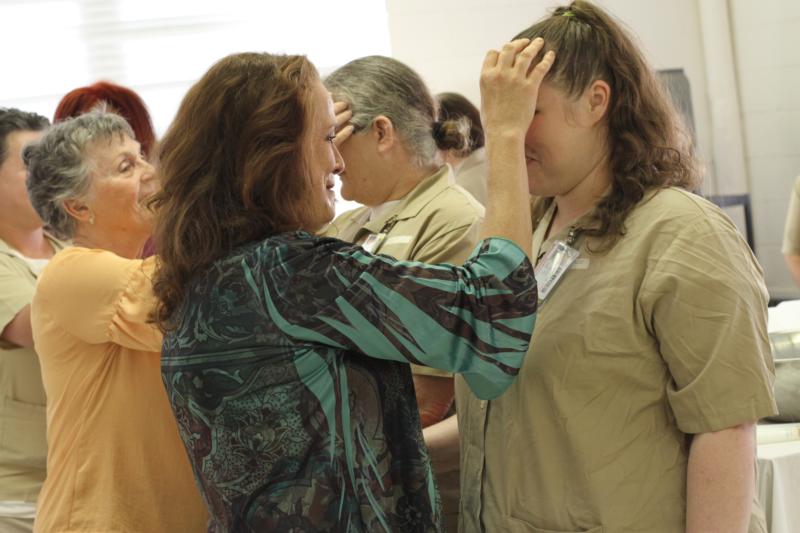
Catherine Boys of St. Thomas Aquinas Catholic Church in Alpharetta, Ga., marks the sign of the cross over the forehead of a baptism candidate, who is an inmate at Lee Arrendale State Prison in Alto, Ga., in this 2014 photo. Participating in prison ministry is an act of charity that can be taken up during Lent to deepen our commitment to love. (CNS photo/Michael Alexander, Georgia Bulletin)
“Beth” teaches high school English as a second language, and many of her students are from the city’s large refugee community. When one of her students was frequently absent, which was affecting his progress, she discovered the reason was basic and solvable.
With the harsh Midwestern winter setting in, his family had no winter clothing. Walking to school in sandals and a T-shirt wasn’t cutting it in the cruel north wind. Beth discovered several refugee students faced the same problem.
She made a list of first names and sizes, and presented them to our faith sharing group. Who would take a name? Bags full of new boots, coats and gloves quickly appeared at Beth’s back door and school attendance picked up markedly.
[hotblock]
Another person in our faith sharing group, “Mary,” visits a Somali man who is seeking asylum in the U.S. He has been jailed for 18 months as his case drags between a judge, who has granted him asylum, and U.S. Immigration and Custom Enforcement, which repeatedly appeals the judgment.
Mary has faithfully visited the man, offering friendship. Others have joined her, and others have provided financial support to his family members who have escaped to South Africa.
These are acts of charity, and although they did not all occur during the season of Lent, they were born out of the theological lesson of Lent lived out in faith, the lesson of Jesus’ life, passion and death all given as an example for us. They were born of love, which is the meaning of charity.
In our culture the word “charity” often has a limited connotation. Sometimes, we equate “charity” mainly with the check we write or the change we drop in the bell ringer’s bucket. These are important acts of charity.
But they are the fruit of a deeper meaning of charity, a love that becomes woven into the fabric of our lives. Pope Francis has said that charity is “the soul of the (church’s) mission.” For this reason, Lent should become for us not a 40-day checklist, but a school of love.
[hotblock2]
Vinita Hampton Wright writes that we should love “as if loving is the first thing on our to-do list.” We could make that our Lenten morning mantra. How will I love more generously today? How will I pay greater attention to others’ needs, whether my children and spouse, the irritating guy at the next desk, or the homeless in my city?
My Lenten sacrifices should deepen my commitment to love. Instead of giving up chocolate with an ulterior motive of losing five pounds, how will I let my “giving up” reach outward? Can I give up something that has definite monetary value, like a morning latte, and dedicate that money to a worthwhile cause?
Perhaps giving up screen time will help me intentionally focus more on my kids or give me the time to volunteer at a food pantry. Our sacrifice should change us and move us forward in loving.
In her book, “Mercy in the City: How to Feed the Hungry, Give Drink to the Thirsty, Visit the Imprisoned, and Keep Your Day Job,” Kerry Weber attempts to live out each of the corporal works of mercy during Lent.
The corporal works of mercy could become our roadmap for Lent, a template for love in action that will expand our love in the years and months ahead.
The example of Mary and Beth teaches us that being part of a faith community can provide us with opportunities to love that we might otherwise miss. Our parish community provides such opportunities. During Lent, offer to take the Eucharist to the homebound, participate in sponsoring a refugee family or support the parish food drive.
By Easter, you will find yourself changed by these experiences. You may find that loving has become a lot closer to the top of your to-do list.
***
Caldarola is a freelance writer and a columnist for Catholic News Service.


Share this story